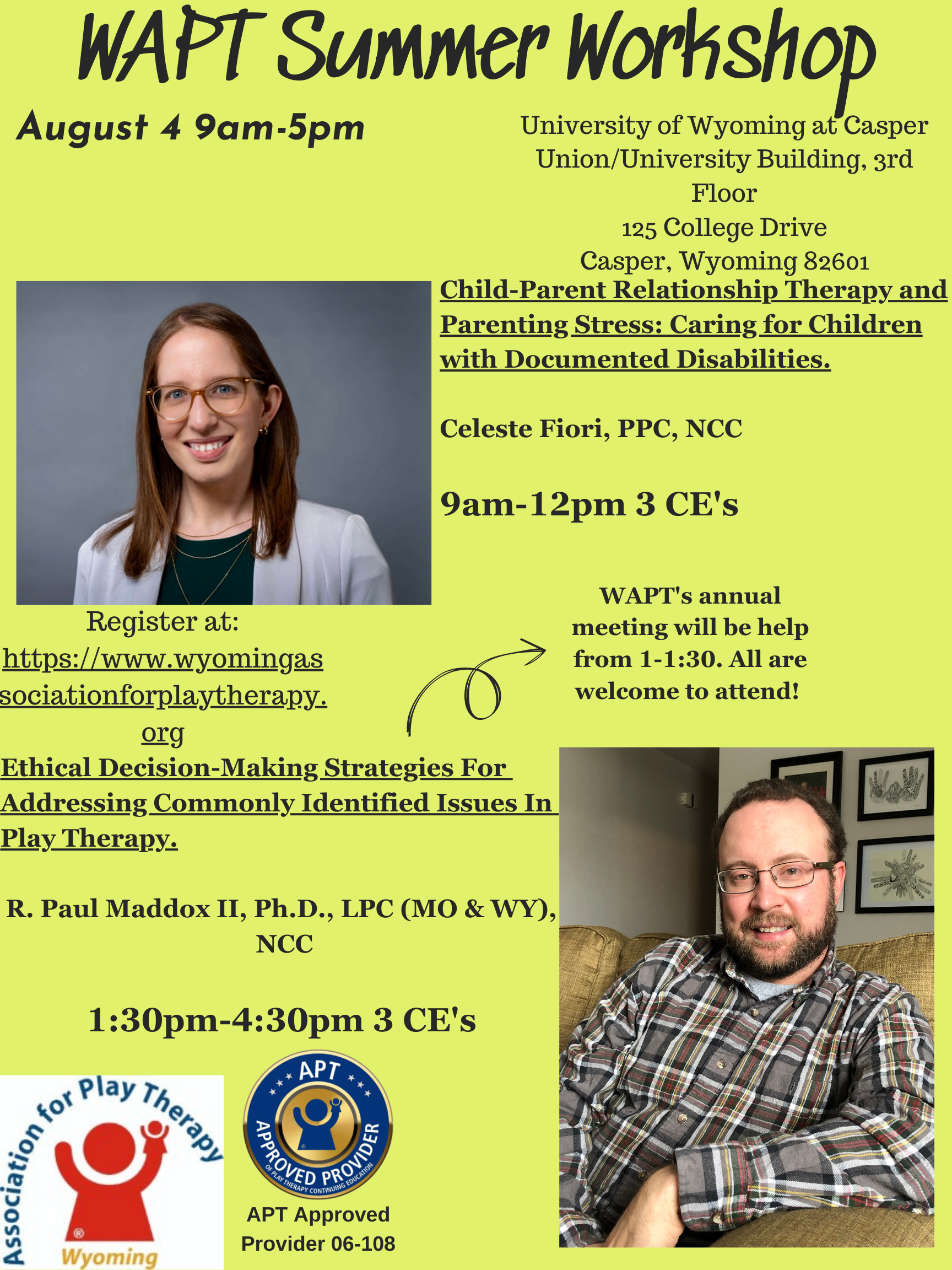2026 IPTW Training!
February 4, 2026
Online via zoom
5-7pm
In this creative workshop, participants will harness the power of improv comedy to develop the essential attitudes of an effective play therapist: congruence; unconditional positive self-regard; unconditional positive regard; empathic understanding; and playfulness.
Improv comedy is a collaborative, relationship-based art form that can help play therapists cultivate the attitudes they need to more deeply and empathetically respond to children engaged in imaginary play. In fact, at Comedy Is Therapy, we believe that play therapy is improvisation…But don’t take our word for it, come experience it for yourself!
For new and experienced play therapists alike, this interactive and experiential workshop will be informative, fun, and playful!
Learning Objectives
1. Learn how to apply the basic tenets of improv comedy to their daily play therapy practice.
2. Participate in six foundational improv comedy exercises that strengthen the five attitudinal conditions of an effective play therapist.
3. Personally experience the healing power of play together by practicing a form of imaginary play for adolescents and adults: Improv comedy.

Summer Workshop August
Presenter:
Celeste Fiori, PPC, NCC
Title of Presentation:
Child-Parent Relationship Therapy and Parenting Stress: Caring for Children with Documented Disabilities
Description:
This presentation will discuss a culturally sensitive approach to supporting children diagnosed with documented disabilities and their caregivers. The aim of this presentation is to explore child-parent relationship therapy (CPRT) as an effective intervention for decreasing general parenting stress and pediatric illness-related parenting stress, as well as increasing positive parent self-efficacy. Participants will explore underserved groups and how to utilize play to address the unique challenges that are present within these groups through experiential activities. Exposure to traumatic medical events involving children with documented disabilities and their parents can influence how the child adjusts to these unpredictable times, emphasizing the function of the parent-child relationship in these circumstances (Christofferson et al., 2020). Overall, by focusing on specific play themes, cultural considerations, and relationships, play therapists can help support parents while they navigate an extremely challenging journey with their child.
Christofferson, J. L., Okonak, K., Kazak, A. E., Pierce, J., Kelly, C., Schifano, E., Sciolla, J.,
Deatrick, J. A., & Alderfer, M. A. (2020). Family consequences of potentially traumatic
pediatric medical events: Implications for trauma-informed care. Journal of Family
Psychology, 34(2), 237–246. https://doi.org/10.1037/fam0000597
Learning Objectives:
Participants will learn about three types of documented disabilities.
Participants will identify two new cultural considerations when working with underserved populations in play therapy.
Participants will work through one child-parent relationship therapy (CPRT) session using medical trauma-specific language and examples specific to children with documented disabilities.
Presenter:
R. Paul Maddox II, Ph.D., LPC (MO & WY), NCC
Workshop Title:
Ethical Decision-Making Strategies For Addressing Commonly Identified Issues In Play Therapy
Workshop Description:
In this workshop, the benefits of utilizing an ethical decision-making model when addressing various commonly identified issues in play therapy will be examined. Strategies for ethical decision-making in play therapy will be discussed. Participants will engage in playful and creative activities to help them explore various components of the ethical decision-making process.
Learning objectives:
During this workshop, participants will:
1) Examine the steps involved in ethical decision-making utilizing a model that can be applied to play therapy practice
2) Explore the benefits of utilizing an ethical decision-making model when facing commonly identified dilemmas in play therapy
3) Identify strategies and tools that can assist play therapists in making ethical decisions.
Our cancellation and refund policy can be found under the tab Policies.

2020 Conference
Reaching Children Through Play: An Experiential Approach
Dr. Norton is the co-founder of Experiential Play Therapy®. He has co-authored the book, Reaching Children through Play Therapy: An Experiential Approach. He has authored and published several articles on play therapy and authored the newsletter for the Center for Experiential Play Therapy. His presentations have included several state and national APT conferences and programs throughout Europe, Asia, and Africa. His focus is on trauma dynamics in very young children and will emphasis the meanings of metaphorical expressions during play therapy.
Webinar Description: Children express the dynamics of their trauma experiences through their play process. The child also expresses several other levels of how the trauma experience has affected their functioning. This workshop will explain and demonstrate how children express the details of their trauma experience through play. These different levels of individual functions will be discussed and demonstrated with children in different developmental stages and expressed as part of the play process. The workshop will focus on how play therapists can respond in the play to move the child through the healing process. Dynamics of this process will be presented through video presentations.
This is an incredible two-day event with Dr. Byron Norton, the co-founder of Experiential Play Therapy. Topics include the EPT model and why it works, metaphors of play, therapeutic treatment for trauma, effective play responses, and MORE. Dr. Norton is an engaging speaker with over 40 years’ experience in the playroom. 14 CE credits (non-contact). NBCC credits available. DO NOT MISS THIS EVENT!

